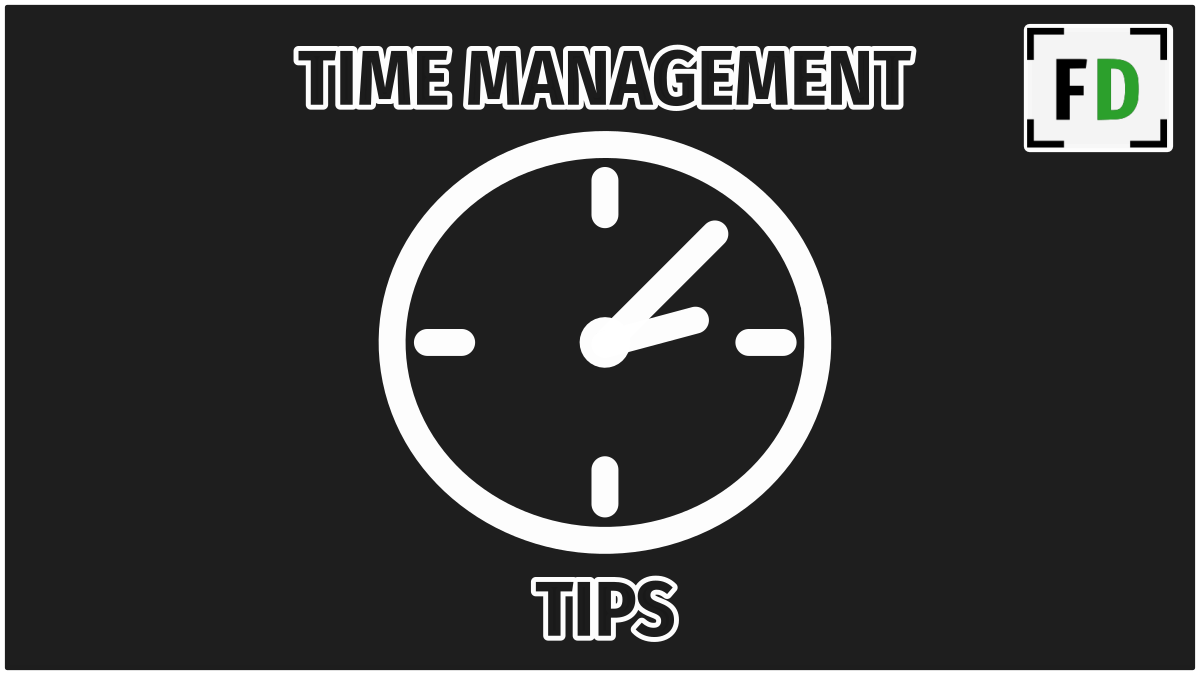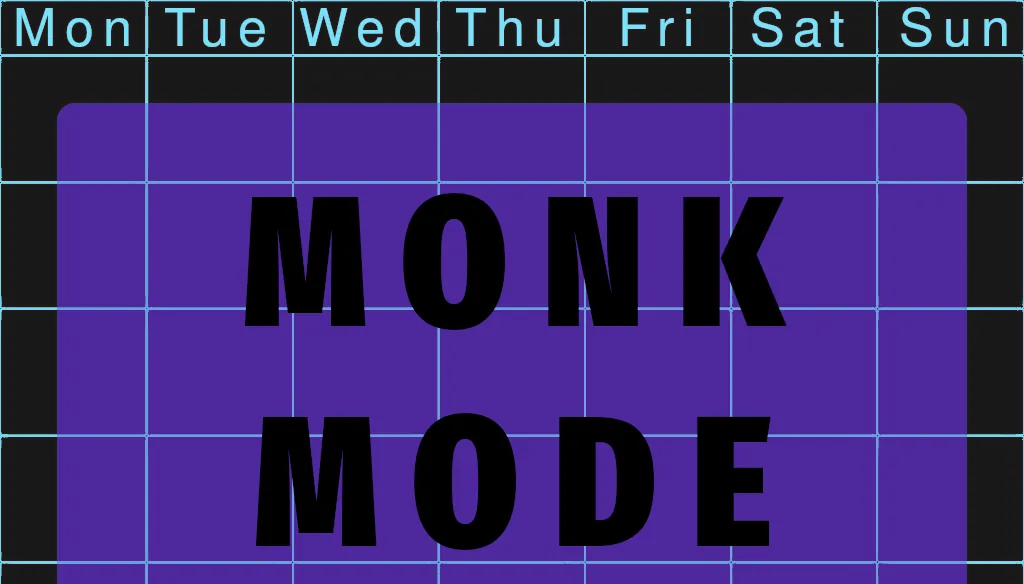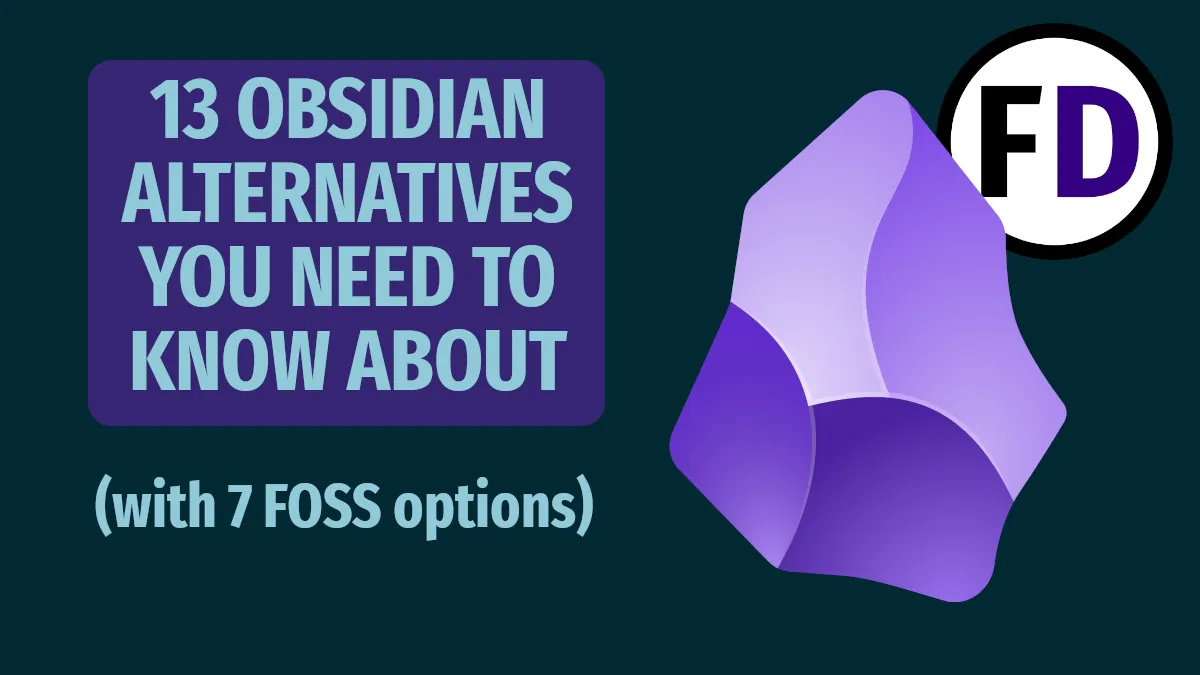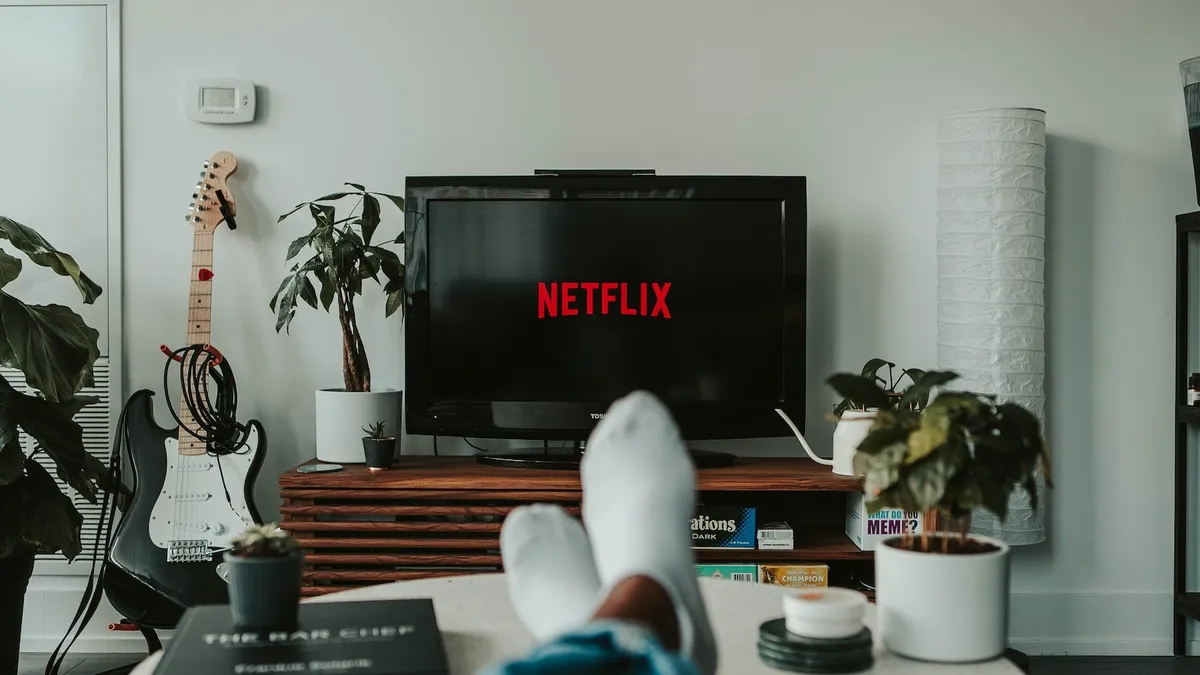We’ve all been there, laying on the sofa, reaching for the remote, trying not to let the Cheetos fall from our chest, watching reruns of our favorite show. If we wanted to, we could figure out a way to do it more, more shows, more snacks, more couch-time. But, should we?
Before figuring out how to get more done, we need to answer the question, What should I do?
We need to be pointed in the right direction and do the right tasks. It will mean asking ourselves fundamental questions about who we are and what we want from life. So wipe away the Cheeto dust from your fingers, and let’s get started.
This article is the first in a series, How to Get More Done. Each post covers a different aspect of becoming the most productive version of yourself.
Why We Want to Get Things Done
Why do we want to get more done in the first place? Why can’t we be satisfied, kick back with a beer, and watch the game? Well, we can, but watching ESPN with a cold one is still something you want to get done.
We’re getting things done all the time. Sitting reading this article is getting something done, and going to the bathroom is getting something done (I hope.) Our lives are a constant stream of things we get done, but if we’re more conscious of where we focus our energy, we’ll live better lives.
If you think spending more time with your family constitutes a better life, then interrupting that stream and deliberately focusing your attention on them would make your life better, by your own standard.
Most productivity philosophies concentrate solely on the idea of doing more and never ask if we’re spending our time on the right activities.
Why do we want to get more done? Because if we do the right things, more can only be better.
The way to know if we’re focused on the right tasks is to ensure the categories of our lives align with our core values and principles. Here’s how to do it.
Define Your Areas of Focus
The first step of figuring out what we should do and later stop us from veering off track is creating a short list of our areas of focus – the broad categories of our lives.
These are not tasks or goals. They can’t be completed or checked off; they are the areas or categories of our life. Discover them by asking, “What do I really care about?” or “What categories do my tasks often fall under?” Here are mine:
- Finances
- Health
- Fitness
- Family
- Religion
- Writing
- Martial Arts
- Homeschooling
- Reading
- Languages
- Photography
- Juggling
We all tend to share some areas of focus. We’re all concerned with our finances and health (at least we should be), but others are unique to us.
We’re not making an exhaustive list here, I enjoy drinking coffee, but I don’t include it as an area of my life; I just drink it. How you decide to differentiate your areas of focus is up to you, most people have between seven and fifteen areas.
Your job may provide you with three or four areas of focus if you’re responsible for different types of work. Budgeting, Hiring, and Training may, for you, be areas of focus, for example. Write yours down and use this list of examples if you get stuck.
Are Your Areas of Focus in Alignment?
Our areas of focus should match our core values. We can compare our areas with our values like this:
- “I think art is important, but it isn’t in my areas of focus.”
- “Knowledge and truth are important to me, but I don’t spend much time reading.”
- “I believe charity work is essential for an ethical person, but it’s not listed as an area.”
These are three examples where someone is out of alignment. They’re not focused on doing the things they care about. To remedy this, art, reading, and charity should be added to their areas of focus. Adding goals (below) will get them back into alignment.
We don’t necessarily need a list of our core values or principles to do this, although that can be helpful. Discovering core values is a never-ending process. We can write them down, but the list will never be complete.
Make a Vision for Your Life
We’re getting somewhere! We know the categories of our lives; now it’s time to look to the future. What would success mean to us? This is our vision for the future. Over a decade ago, I wrote this as my vision:
“A quiet life in the country in a house with a big garden and a dog.”
That was my vision. It doesn’t cover every area of my life, nor was it set in stone. Make one, so your vision will give you a direction to measure your goals.
Goals
We’ve all read about the value of setting goals, but it’s a truism because it really is true.
Trying to create goals out of nothing can seem arbitrary and scattered. We’ll probably make some good ones but never feel we’ve covered all we should.
But now, we have a blueprint of our life—our areas of focus. We can use it to systematically set our goals, bringing us closer to what we should do.
The process is simple. Underneath each of our areas, we’ll write related goals. Once we’re done, each area will have at least one or two (and likely many more) goals.
- Worrying about whether a goal is long or short-term is not something we’ll concern ourselves with; we don’t know how long any of them will take. For example, you may have a ten-year goal of owning a small farm, but the right opportunity might crop up next week.
Will the goal help you towards your vision? If not, do you really want to accomplish it? Maybe you do.
Alignment – What You Shouldn’t Do
We now have a hierarchy with our vision of success at the top, our areas of focus in the middle, and our goals below.
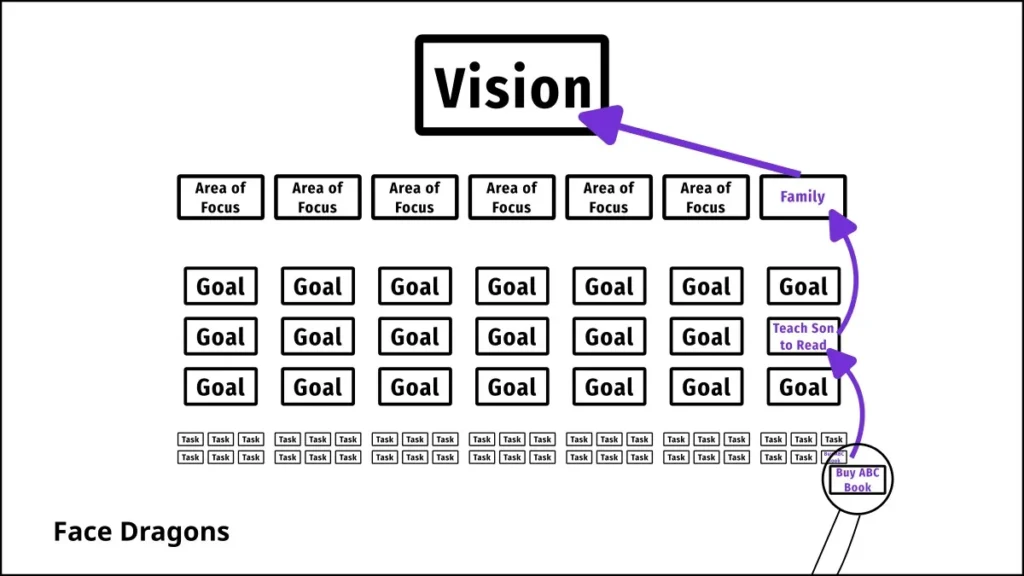
We’ll never have nothing-to-do again, and “what should I do?” can become “What goal should I work on today?”
Our new hierarchy is also a helpful tool for checking alignment. If we have a task, for example
- Rewriting some notes
We can use the hierarchy to check whether it’s something we should spend our time doing.
- Is it going to make progress towards one of your goals?
- Is this task under one of my areas of focus?
- Is this task taking me closer to my vision?
If it isn’t, maybe you’ll still do it, but how much of your time are you willing to spend on tasks that don’t make progress on what’s important to you?
Prioritization Is a Scam
We can now see whether a task is something we should do or not, but when we have many aligned tasks, how do we decide between them?
Many methods have been offered to help knowledge workers prioritize their tasks. A simple ABC priority written beside the task (or in software) seems like a good idea.
But how then do we decide between two A-level tasks? Subprioritization? A1, A2, A3, etc.?
No, tasks don’t easily fall into prioritization categories and can change in an instant. So, for example, a new task from your boss may go straight to the top of your priorities, only to be dethroned by a task from a regional director (his boss.) And if a family member had an accident, both of these tasks would slide quickly down the priority pole.
You can’t decide on priority beforehand because you don’t know how your day will unfurl.
The Eisenhower Matrix
We’ve all heard of the Eisenhower matrix, a method to prioritize our tasks using urgency and importance. It’s a good idea, and it works.
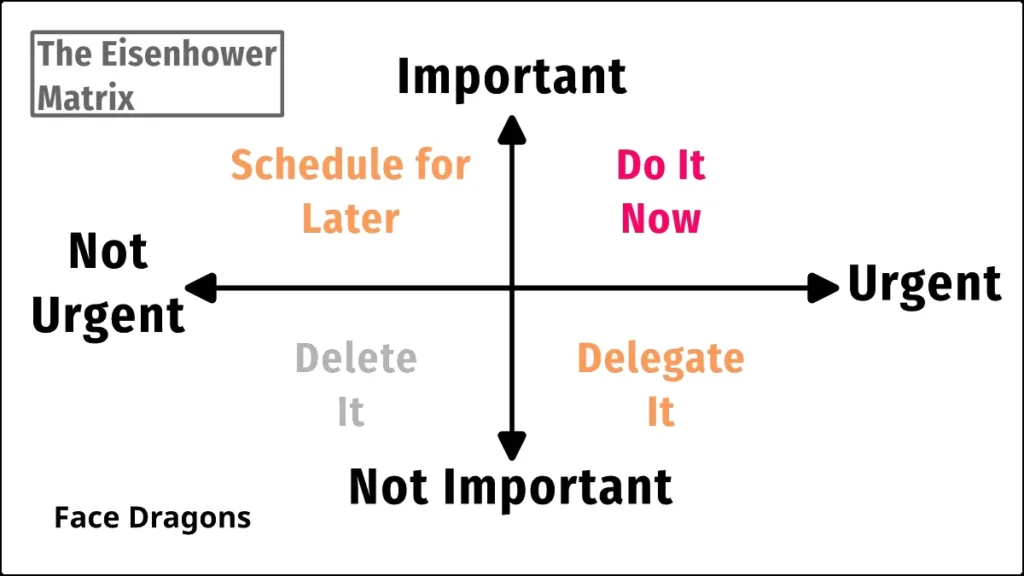
But using it during our day to make quick decisions about what we should do, we find it’s also flawed. Eisenhower once quipped:
“I have two kinds of problems, the urgent and the important. The urgent are not important, and the important are never urgent.”
Dwight D. Eisenhower
How important is handing in your expenses? More important than calling this client back? You want your expenses back this month, but you might get a good commission if this client buys.
Sure, sometimes it’s obvious, but most of our tasks live somewhere between important and urgent; I’d rather not have to find out where.
Your Brain is a Prioritizing Machine
Rather than creating an arbitrary priority scheme, we can decide on priority in the moment. Our brains are perfectly equipt to do this. Though it may not always feel like it, according to Hans Morvec, principal research scientist at the Robotics Institute, your brain is capable of 100 trillion calculations per second.
Our brain knows what we want, what we care about, everything that’s happened that day, and our expectations for the rest of the day.
It can take importance and urgency into account in a split second.
A glance at a short list of tasks and our brains instantly tell us which task we should care about most. But there are some caveats.
- Your task pool needs to be complete – If there are other tasks you could not do on the list, your brain doesn’t have what it needs to make a choice. We’ll cover how to do this in the next article in the series: Task Management.
- Your tasks need to be well defined – “Finalize Wedding” is not well defined; what do you need to do? Propose? Buy the rings? Or send a deposit to the wedding planners?
Task management is the subject of the next article in this series so read it next! You’ll learn:
- How to create a pool of the best tasks to do
- Best task management apps
- What we can learn from Pomodoro, Bullet Journaling and GTD
- The best task management system for you
How to Get More Done – Task Management
Or Go Even Deeper on What You Should Do With These Three Books
These are affiliate links, and I may make a small commission at no cost to you if you purchase one. I will be grateful if you do, though!
You Can Still Enjoy Cheetos
Don’t make the mistake of thinking that you should force yourself to work non-stop. Have the Cheetos, the beer, and watch the game, but do it because you decided you should.

